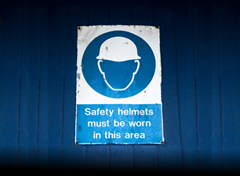Project Peace of Mind - Site Insurance and Structural Warranty

When embarking on a major project like a self build or a major renovation, getting your planning and preparation right will lead to a much smoother project. However, no matter how well you plan, things can and do go wrong and it is essential that you have the appropriate insurance in place for your project. Here, BuildStore explains why insurance and warranties are a necessity, not a luxury.
As well as making sure you have the right type of insurance policy for your project to protect it during construction, you should make sure that you are covered post-construction, and you will need decide whether to take out a Structural Warranty or if you will rely on Architect certification of your build to provide this protection. Here, BuildStore provides the low-down on how to protect your build and your new home.
Site Insurance
Whether your project is a new build, renovation or conversion, you will require adequate protection to safeguard the construction project. This applies whether you are building the property for your own occupation or if you are developing a house for profit.
A major building project can be stressful; unexpected events such as a flood, fire or theft of materials could seriously impact on both the timescale for the build and costs and could have a disastrous effect on your ability to finish your new home. With a major project, it is essential that your investment in both time and money is protected against any major problems. It is therefore essential that you have adequate site insurance cover in place and indeed, if you are borrowing to finance your project, you will be required as a condition of your mortgage to have the cover in place.
Site insurance can provide you with cover for all the things which can go wrong during your build and also covers materials and equipment on site. Remember, building sites are dangerous places, accidents happen and because the site is often deserted at night, damage can occur and materials and machinery can be stolen.
You should ensure your site insurance policy has comprehensive cover and protection, including:
- Public liability - This provides protection against claims in respect of damage or injury to members of the public (for example - injury to trespassers or site visitors or damage to neighbouring underground services)
- Employer's liability - This provides protection against injury claims from sub-contractors. The self builder often assumes the position of being an employer, even if the labour being used is self employed. It is therefore a legal requirement that you have this cover if you are employing anyone on site
- Contract works - This protects the building materials on site and the building in course of construction. For example, if your building were to burn down before it is completed, site insurance would provide the money to get it rebuilt
In addition to these, the following cover is usually included:
- Cover for plant, machinery and tools both owned and hired in
- Cover for site huts, stores and caravan if you are living on-site during construction
- Legal expenses - this gives you funds to take legal action where things go wrong, such as if you have problems with a professional working on the project or with the supplier of materials.

The cover should last for the period of your project and it is usually set up for an 18 month or two year period, with the option to extend it if you have not finished the project by the end of the cover period. A single payment is made to cover the term of the policy and to give you value for money, some policies such as BuildCare will convert the site insurance policy to buildings and contents cover for the remainder of the term period if you finish the build before the end of the policy.
When should I take out cover?
As soon as you own your plot or building being renovated you become liable for any injuries to members of the public on your site. You should therefore arrange for your site insurance to start when you purchase your plot or property.
I have a main contractor - do I still need site insurance?
If your contractor has adequate cover and you will not be employing any subcontractors or, if you have any of your own plant and materials on site you may not require site insurance. However, public liability is still your responsibility and you need to ensure that your builder maintains adequate cover at all times and that it covers the project, even when there are no workmen on site. In addition, the builder's insurance is not likely to commence until they start work on the site so you would need public liability cover and cover for any existing structures, until this time. It is therefore often best to take out your own cover to ensure continuity of cover, should anything go wrong with the main contractor or their insurance.
For a renovation project, does site insurance cover the property to be renovated?
Yes. You will need to give a reinstatement value for the building that exists, plus the cost of your project, when you ask for a quotation and both parts will be covered. You are also likely to be asked for pictures of the existing building so that underwriters can see its current condition.
I am going to sell the property when it is finished - can I still get site insurance?
Yes but you need to tell the insurer that you are developing for profit so they can charge the appropriate rate and so that you can be sure that they will pay out if there is a claim. BuildCare Pro is one policy that has been specifically designed for developers.
Structural Warranties

While few people would buy a new house without a 10-year structural warranty, many self builders ignore a warranty for their project, and opt instead for Architect Certification of their property.
While this may save some money during the project, it could be a false economy as an Architect's Certificate states only that the building has been built to the required minimum standard, and is not an insurance policy. If there is a structural fault once your home is complete, it would be down to you, the home owner, to take legal action to prove that the structural fault was as a result of the Architect's negligence. This is much less attractive than having an insurance policy which covers specific occurrences regardless of the problem or who is responsible.
A Structural Warranty will usually last for 10 years and provide the following cover:
- Cover for the cost of complete or partial rebuilding or rectifying work to the new development which has been affected by major damage
- Cover for the cost of making good any defect in design, workmanship, materials or components in the drainage system.
- Cover for repairing, replacing or rectifying any part of the waterproof envelope as a result of the ingress of water caused by a defect in the design, workmanship, materials or components
- Cover for the cost of making good any defects in the chimneys and flues which was newly constructed causing imminent danger to the health and safety of occupants
In addition to this cover, the warranty normally includes a Site Technical Audit and "key stage" technical inspections. This not only gives you the comfort of knowing that your build is progressing properly, but can also be used as the trigger for the next stage of your self build mortgage being released, if you are using an advance stage payment mortgage. Moreover, if you are planning to sell your new house within 10 years of its completion, the Warranty can be transferred to the new owner for the balance of its term is a valuable sales feature.
Preparation for any project of this nature is very important and the time to select your site insurance and warranty is during the planning stage. This will ensure that if things do go wrong during your project, you have the means to overcome any problems and get your build back on track as quickly as possible.


